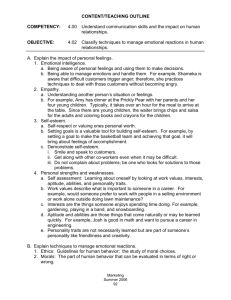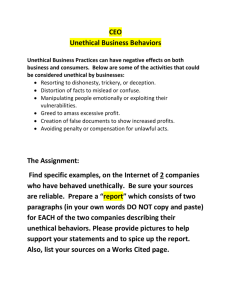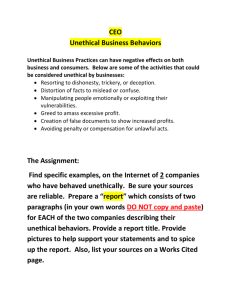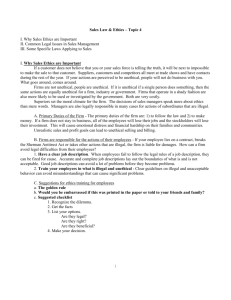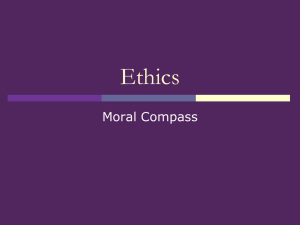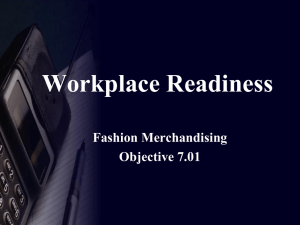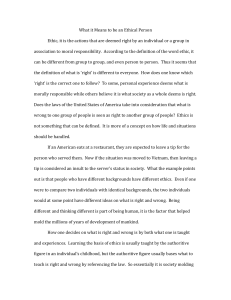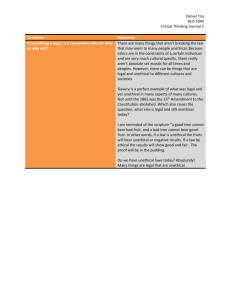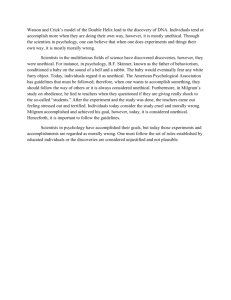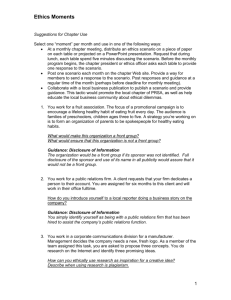MARKETING 4.02 NOTES Explain the impact of personal feelings
advertisement
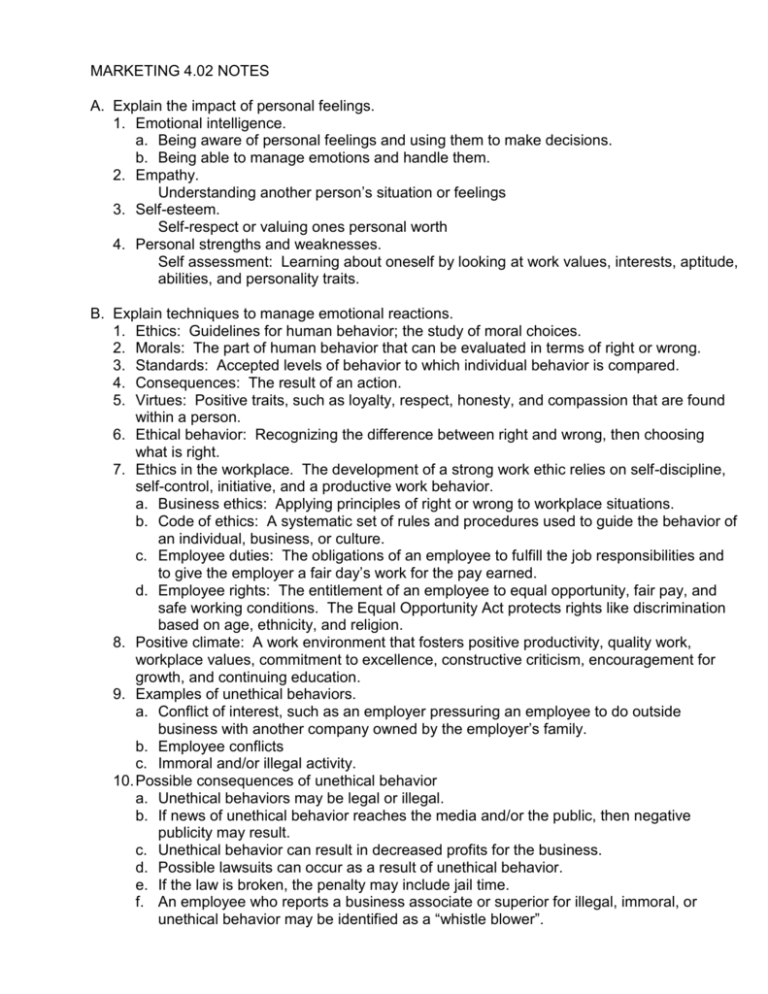
MARKETING 4.02 NOTES A. Explain the impact of personal feelings. 1. Emotional intelligence. a. Being aware of personal feelings and using them to make decisions. b. Being able to manage emotions and handle them. 2. Empathy. Understanding another person’s situation or feelings 3. Self-esteem. Self-respect or valuing ones personal worth 4. Personal strengths and weaknesses. Self assessment: Learning about oneself by looking at work values, interests, aptitude, abilities, and personality traits. B. Explain techniques to manage emotional reactions. 1. Ethics: Guidelines for human behavior; the study of moral choices. 2. Morals: The part of human behavior that can be evaluated in terms of right or wrong. 3. Standards: Accepted levels of behavior to which individual behavior is compared. 4. Consequences: The result of an action. 5. Virtues: Positive traits, such as loyalty, respect, honesty, and compassion that are found within a person. 6. Ethical behavior: Recognizing the difference between right and wrong, then choosing what is right. 7. Ethics in the workplace. The development of a strong work ethic relies on self-discipline, self-control, initiative, and a productive work behavior. a. Business ethics: Applying principles of right or wrong to workplace situations. b. Code of ethics: A systematic set of rules and procedures used to guide the behavior of an individual, business, or culture. c. Employee duties: The obligations of an employee to fulfill the job responsibilities and to give the employer a fair day’s work for the pay earned. d. Employee rights: The entitlement of an employee to equal opportunity, fair pay, and safe working conditions. The Equal Opportunity Act protects rights like discrimination based on age, ethnicity, and religion. 8. Positive climate: A work environment that fosters positive productivity, quality work, workplace values, commitment to excellence, constructive criticism, encouragement for growth, and continuing education. 9. Examples of unethical behaviors. a. Conflict of interest, such as an employer pressuring an employee to do outside business with another company owned by the employer’s family. b. Employee conflicts c. Immoral and/or illegal activity. 10. Possible consequences of unethical behavior a. Unethical behaviors may be legal or illegal. b. If news of unethical behavior reaches the media and/or the public, then negative publicity may result. c. Unethical behavior can result in decreased profits for the business. d. Possible lawsuits can occur as a result of unethical behavior. e. If the law is broken, the penalty may include jail time. f. An employee who reports a business associate or superior for illegal, immoral, or unethical behavior may be identified as a “whistle blower”. C. Explain cultural sensitivity. 1. Cultural sensitivity: Awareness of cultural differences and similarities. 2. Diversity: Different people have different backgrounds and identities. People are diverse in terms of demographics, geographics, and psychographics. 3. Business etiquette: Acceptable social behavior in business or professional situations. Business etiquette differs from country to country. a. In the United States, receiving a gift from a business partner could be seen as a bribe; in Japan it is customary. b. Do not schedule a sales appointment in France before 10:00 am. Do not schedule one in Spain during siesta time. In the US, it is quite appropriate to plan a power lunch or breakfast meeting. 4. Stereotyping: Identifying someone or something by a single trait or as a member of a certain group rather than as individuals. For example, women are often used in ads in the role of the housewife; this ignores all the other roles women have in society and business. 5. Cultural bias: The belief that one’s own culture is the best. This often leads to a more severe cultural problem called prejudice, which brings out hostility towards a group. D. Understand positive interactions in business relationships. 1. Treat others fairly at work. a. Employer/Employee relations. “Happy employees = Happy customers = More profits.” Many companies strive to keep their employees satisfied, motivated, and loyal by offering competitive wages, attractive benefits packages, and other incentives. b. Benefits: Added compensation other than money an employer gives his/her employees. For example, paid vacation, insurance, and a retirement fund. c. Incentives: Includes tuition reimbursement, special bonuses, special recognition, performance awards, and internal promotion programs. 2. Use appropriate assertiveness. Standing up for what one believes in by showing confidence and authority. People will not respect someone if he/she is too pushy and aggressive. 3. Foster positive working relations. a. Teamwork: The good working relationship among employees resulting from combined support, leadership, and cooperation. For example, employees are asked to work together as a team to complete a task. The more effectively the team members work together, the more likely they are to achieve the desired goals for the business. b. Agreement: A specific commitment made by a person or a group of people. For example, each member of the DECA Chapter made an agreement with the advisor to bring in canned food for the food drive. c. Consensus: A collective agreement reached by the members of a group. For example, the DECA Chapter reached consensus on the details for the community service project.
